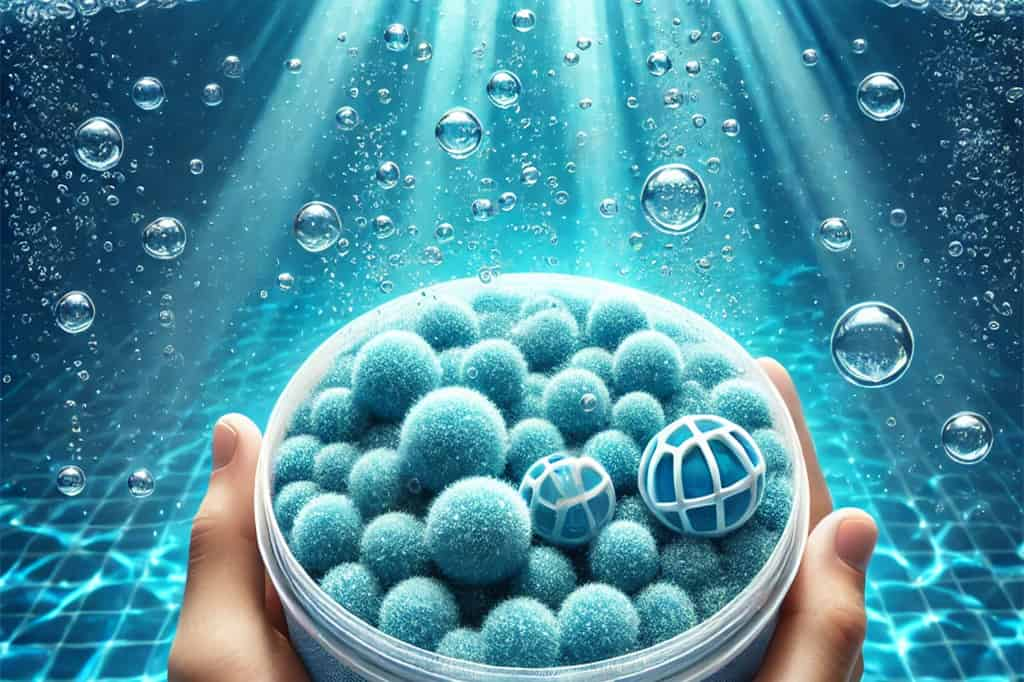As pool owners increasingly seek more efficient, eco-friendly alternatives to traditional pool filters, filter balls pool systems have gained considerable popularity. These innovative filtering systems use small, lightweight filter balls instead of conventional sand or cartridge filters to clean pool water. But as with any new technology, questions about durability and long-term performance arise, particularly in outdoor settings where exposure to natural elements like sunlight is inevitable. One of the most frequently asked questions is: Will sunlight exposure reduce the effectiveness of filter balls pool systems?

What Are Filter Balls Pool Systems?
Before we dive into the effects of sunlight, it’s important to understand how filter balls pool systems work. These systems are designed to replace traditional sand filters with filter balls, which are made from polyester or similar materials. Unlike sand, filter balls are highly efficient, capturing even the smallest particles from the water, and they are significantly lighter and easier to handle.
One of the advantages of using filter balls pool systems is that they require less backwashing and maintenance compared to sand filters. They also promote better water circulation and reduce energy consumption, making them a more eco-friendly option. With proper care, these filter balls can last for several pool seasons, providing consistently clean and clear water.
How Sunlight Affects Filter Balls
Sunlight, particularly ultraviolet (UV) rays, can have a deteriorating effect on many materials, especially those made from plastic or synthetic fibers. While the filter balls pool system is highly durable, prolonged exposure to direct sunlight can potentially reduce the lifespan and effectiveness of the filter balls over time. Here’s how:
1. UV Degradation:
Over time, UV rays can weaken the fibers of the filter balls, causing them to break down and lose their filtration efficiency. If the filter balls are consistently exposed to sunlight while in storage or during operation, they may become brittle and less effective at capturing particles in the water.
2. Heat Damage:
Sunlight exposure also brings heat, which can affect the structural integrity of the filter balls. Excessive heat may cause the filter balls to warp or lose their shape, impacting their ability to maintain consistent water flow through the filtration system.
3. Chemical Reactions:
When combined with pool chemicals like chlorine, sunlight can exacerbate the wear and tear on the filter balls. The heat from the sun can accelerate the chemical reactions between chlorine and the filter balls, leading to faster degradation.
How to Protect Your Filter Balls Pool System from Sunlight
While exposure to sunlight is a natural part of outdoor pool maintenance, there are several steps you can take to protect your filter balls pool system and extend the lifespan of the filter balls:
1. Proper Storage:
When not in use, store your filter balls in a shaded, cool area to prevent UV exposure. Keeping them in a sealed container or covered area can help reduce the effects of sunlight and heat on the material.
2. Use a Pool Cover:
Using a pool cover when the pool is not in use can significantly reduce the amount of sunlight hitting the filter balls during operation. A cover will not only protect the filter balls but also help maintain water temperature and reduce evaporation.
3. Monitor Chemical Levels:
Be mindful of the chemical levels in your pool. Excessive chlorine combined with sunlight can accelerate the breakdown of filter balls. Regularly check and balance the pool’s pH and chlorine levels to ensure they remain within the recommended range.
4. Replace Damaged Filter Balls:
If you notice that the filter balls have become brittle, discolored, or less effective, it’s essential to replace them. Over time, all filter media will degrade, and using compromised filter balls can reduce the overall performance of your pool’s filtration system.
The Role of Quality in Durability
Not all filter balls are created equal. The type and quality of the filter balls you choose can significantly impact how well they stand up to sunlight and other environmental factors. High-quality filter balls, such as polysphere filter balls, are designed to be more resistant to UV damage and general wear and tear. These polysphere filter balls are made from materials that offer superior durability, making them less likely to degrade under sunlight exposure compared to cheaper alternatives.
On the other hand, if you’re using cheap sand filter balls, you may find that they degrade faster when exposed to sunlight. While cheap sand filter balls may seem like a cost-effective option initially, they often require more frequent replacement due to their lower durability. Investing in higher-quality filter balls can save you money in the long run by reducing the need for frequent replacements and ensuring consistent filtration performance.
Conclusion
In conclusion, while sunlight exposure can potentially reduce the effectiveness of filter balls pool systems over time, proper care and maintenance can mitigate these effects. By storing filter balls properly, using a pool cover, monitoring chemical levels, and choosing high-quality products like polysphere filter balls, you can extend the life of your filter balls and maintain optimal water quality.
It’s important to remember that the longevity and effectiveness of your filter balls depend not only on how you protect them from sunlight but also on the quality of the product itself. While cheap sand filter balls might offer an affordable short-term solution, investing in more durable options will provide better long-term results.
For pool owners looking to maximize the lifespan and efficiency of their filter balls pool system, taking preventative steps to shield the filter balls from excessive sunlight exposure and opting for high-quality materials are key strategies. With the right care, your electric pool filtration system will continue to provide crystal-clear water for many seasons to come.
